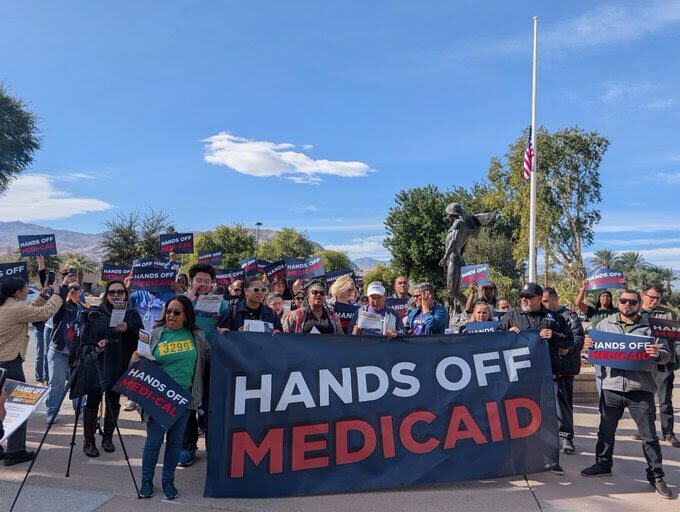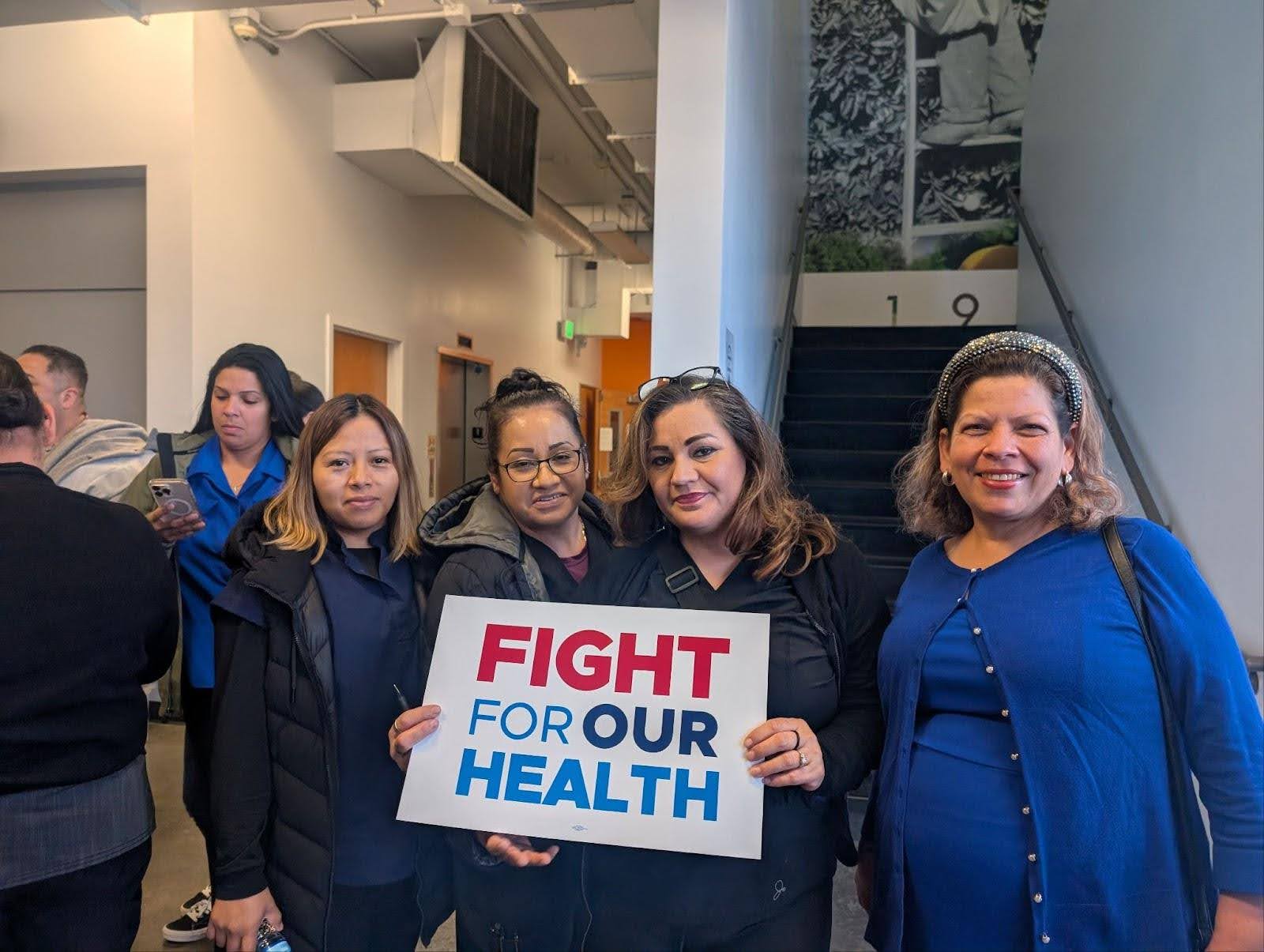
“I don’t think people should be taking medical advice from me.” – HHS Secretary Robert F. Kennedy Jr.
Welcome to Public Health Watch, a weekly roundup from Protect Our Care tracking catastrophic activity as part of Donald Trump’s sweeping war on health care. From installing anti-vaccine zealot RFK Jr. as Secretary of HHS to empowering Elon Musk to make indiscriminate cuts to our public health infrastructure, including the National Institutes of Health and the Centers for Disease Control, Donald Trump is endangering the lives of millions of Americans. Protect Our Care’s Public Health Watch will shine a spotlight on the worst of the Trump/RFK/Musk war on vaccines, science and public health and serve as a resource for the press, public and advocacy groups to hold them accountable.
What’s Happening In Public Health?
Catastrophic Cuts Are Creating Chaos And Endangering Americans’ Health And Scientific Innovation
HuffPost: RFK Jr. Insists He Hasn’t Fired ‘Any Working Scientists’ ― After Firing Hundreds Of Them During a Senate committee hearing on Wednesday, Sen. Angela Alsobrooks (D-Md.) had a strange clash with Health and Human Services Secretary Robert F. Kennedy Jr. over the massive cuts he’s overseen at his agency, including to personnel. “You made it very clear here today you have no knowledge whatsoever of the absolutely amazing scientists and researchers who you have callously fired,” said Alsobrooks. “I didn’t fire any working scientists,” Kennedy said. “That, sir, is not true either,” replied Alsobrooks. “It is true,” repeated Kennedy. “It is not true,” Alsobrooks said, moving on. He made the same claim when the Maryland senator later brought up a 30-year program he axed at his agency, the Safe to Sleep campaign, along with all of its staff. He said it again to Sen. Bill Cassidy (R-La.), the chairman of the committee, at the start of the hearing. “The cuts we have made to date are administrative cuts. As far as I know we have not fired any working scientists,” said Kennedy. “There are some people who were scientists that were doing IT or administration … who did lose their jobs. But in terms of working scientists, our policy was to make sure none of them were lost and that that research continues.” That sounds nice. But also it is not true. Kennedy has been firing hundreds, if not thousands, of scientists and researchers doing critical work at various agencies under HHS. It’s not even as if he’s been doing this in secret; it’s been widely reported for months.
New York Times: Kennedy, Defending Downsizing, Clashes With Democrats in Tense Hearings Health Secretary Robert F. Kennedy Jr. delivered a defiant defense on Wednesday of his drastic overhaul of federal health agencies, insisting to members of Congress that he had “not fired any working scientists” and was “not withholding money for lifesaving research” despite evidence to the contrary.
CNN: Trump administration cut $2.7 billion in NIH research funding through March, Senate committee minority report says A Senate committee report by minority staff, and obtained by CNN, slams the Trump administration for terminating some funding for research, firing thousands of federal workers and removing certain scientific data from government websites. The Senate Health, Education, Labor and Pensions Committee’s minority staff report, released Tuesday and authored by Sen. Bernie Sanders, I-Vermont, says that in the first three months of this year, the Trump administration cut $2.7 billion in National Institutes of Health funding for research. That figure is much higher than some separate estimates that previously suggested targeted grant terminations have affected more than $1.8 billion in NIH funding. The new report, which describes the Trump administration’s actions as a “war on science,” is based on analyses conducted by Senate HELP Committee minority Staff, involving NIH grant funding data as well as HHS self-reported spreadsheets and other sources.
- Agence France Presse: Trump slashed US cancer research by 31 percent: Senate report US President Donald Trump’s administration cut cancer research funding by 31 percent in the first three months of 2025 compared to the same period last year, according to a Senate report released Tuesday that accuses the White House of waging a “war on science.” The analysis, commissioned by the leftwing Senator Bernie Sanders, found that at least $13.5 billion in health funding had been terminated as of April, including 1,660 grants, while thousands of scientific staff were fired. Among the hardest hit was the National Cancer Institute, which lost more than $300 million from January to March compared to 2024, driving inflation-adjusted grant funding to its lowest level in over a decade. Its parent agency, the National Institutes of Health, lost $2.7 billion.
NOTUS: As Contracts Lapse Across HHS, the NIH Awards Millions for Help Becoming MAHA The National Institutes of Health awarded a consulting firm a $7 million contract earlier this month to retain “subject matter experts” who would help the NIH conform to President Donald Trump and Health Secretary Robert F. Kennedy Jr’s vision of a new American public health system. The contract was awarded to Credence Management Solutions without competition through an already-existing General Services Administration contract. It comes as Trump and Kennedy radically reshape the Department of Health and Human Services and how it uses contracts, with orders to slash current spending levels by 35%. Credence is a Virginia-based government contractor that has worked extensively with the U.S. Agency for International Development and the Department of Defense, but rarely with HHS and never before with the NIH. It’s unclear exactly which NIH initiatives Credence’s subject matter experts will support. But the contract’s language suggests a key role in furthering the administration’s “Make America Healthy Again” agenda.
Health Impacts:
Chaotic Firings and Re-Hirings:
Cruel, Destructive, and Corrupt Policy Changes:
The FDA Is Being Dismantled – Stalling Drug Development And Leaving Us Vulnerable To Food-Borne Illness
Stat: FDA commissioner says new vaccine ‘framework’ for industry is coming within weeks Food and Drug Administration Commissioner Marty Makary said the agency is planning to unveil new guidance for vaccine makers, focused primarily on Covid-19 shots, in the coming weeks. “We want to be very transparent, and we want to create a framework for vaccine makers that they can use so they have a predictable FDA where they don’t have to worry,” Makary said at the Food and Drug Law Institute conference on Thursday. Makary said Vinay Prasad, the new director of the center overseeing vaccines, is meeting with industry and FDA staff as he plans to “unleash a massive framework” clarifying the FDA’s regulatory expectations for vaccines. Makary didn’t offer many more details when talking to reporters after his session, but indicated the framework would take the form of agency guidance.
NBC: FDA moves to take prescription fluoride drops and tablets for kids off the market The Food and Drug Administration on Tuesday announced it will begin the process of pulling prescription fluoride drops and tablets for children off the market. The supplements are usually given to kids at high risk for cavities. The federal government and some state legislatures are increasingly drawing attention to what they claim are the risks associated with fluoride, a mineral that’s been used for decades in community water systems, toothpastes and mouth rinses to prevent tooth decay. Dentists fiercely contest the notion that the harms of fluoride outweigh the benefits. “The only side effect that we know of from using fluoride is dental fluorosis,” a cosmetic issue that leads to white or, in extreme cases, brown marks on teeth, said Margherita Fontana, professor and chair of the department of cariology, restorative sciences and endodontics at the University of Michigan.
CNN: After delay, FDA approves Novavax’s Covid-19 vaccine, but only for older people and those at high risk After a six-week delay, the US Food and Drug Administration has approved Novavax’s Covid-19 vaccine, according to a letter from the agency, but only for people 65 and older and those 12 and up who have at least one underlying condition that puts them at higher risk of severe illness. “Market research and US C.D.C. statistics indicate that older individuals and those with underlying conditions are the populations most likely to seek out COVID-19 vaccination seasonally,” Novavax President and CEO John Jacobs said in a statement Saturday. “This significant milestone demonstrates our commitment to these populations and is a significant step towards availability of our protein-based vaccine option.”
RFK Jr. Is An Extreme MAGA Anti-Vaxxer Who’s Breaking His “Assurances” To Key Republicans To Get Confirmed And Mis-Managing HHS
Washington Post: RFK Jr. to Congress: ‘I don’t think people should be taking medical advice from me’ Closing in on 100 days as the nation’s top health leader, Robert F. Kennedy Jr. faced back-to-back congressional hearings Wednesday — defending his messaging on vaccines amid a growing measles outbreak, the firing of thousands of federal health workers, and major cuts to the agencies he oversees. During one of the sharpest lines of questioning in the first hearing in front of a House Appropriations subcommittee, Rep. Mark Pocan (D-Wisconsin) asked if Kennedy, the founder of a prominent anti-vaccine group, would vaccinate his own child against measles today. Kennedy paused before answering, “Probably.” Kennedy went on to say, “I don’t think people should be taking medical advice from me,” and he did not directly answer whether he would vaccinate his own children against chicken pox and polio today. “I think what we’re going to try to do,” he said, “is to lay out the pros and cons, the risks and benefits accurately, as we understand them.”
Stat: HHS to stop recommending routine Covid shots for children, pregnant people, RFK Jr. ally says
Health Secretary Robert F. Kennedy Jr. is set to announce that the Department of Health and Human Services will stop recommending Covid vaccines for children and pregnant people, a close Kennedy ally said Thursday. The news arrived between panels at a daylong event marking the launch of a new Make America Healthy Again-affiliated think tank called the MAHA Institute. “Something just happened that’s really special. I was asked to please make this announcement,” Executive Director Leland Lehrman told attendees. “You might’ve already heard, but today the secretary is announcing that HHS and the CDC are going to stop recommending routine Covid shots for children and pregnant women.” As the room broke out into applause, he chuckled and said, “That’s good! That’s really good.”
Wall Street Journal: Trump Officials Balk at RFK Jr.’s Attack on Pesticides A bid by Health Secretary Robert F. Kennedy Jr. to label pesticides as a potential cause of U.S. health woes has attracted pushback from some White House and agency officials who are concerned the move would disrupt the food-supply chain, according to people familiar with the debate. Kennedy, who is spearheading a coming report to “Make America Healthy Again,” wants to highlight what he views as the deleterious impact of pesticides, people familiar with the matter said. He previously campaigned on removing pesticides from the food supply. White House officials have raised concerns about the pesticide push and are closely reviewing the coming report, the people said, though it wasn’t clear where President Trump himself stood on the issue. And some officials at the Environmental Protection Agency, which regulates pesticides, and Agriculture Department have cast doubt on Kennedy’s desire to cast weedkillers as harmful to health. Trump pledged on the campaign trail to investigate pesticides as part of an effort to win support from Kennedy’s backers.
- Politico: Trump EPA moves to weaken drinking water limits on toxic ‘forever chemicals’ The Trump administration said Wednesday it intends to roll back first-ever limits set by the Biden administration on four toxic “forever chemicals” contaminating water supplies across the country. Even low levels of the chemicals known as PFAS are linked with cancer, immune system problems, developmental effects and other health ailments. EPA-mandated testing has found them in nearly half of Americans’ drinking water.
Washington Post: Unpacking RFK Jr.’s ‘doublespeak’ on vaccines Early last month, after two Texas children had died of measles, Health and Human Services Secretary Robert F. Kennedy Jr. acknowledged that the MMR vaccine prevents the spread of that virus. But later that day, he posted photos of himself with anti-vaccine doctors, calling them “extraordinary healers” and promoting unproven treatments. In a television interview three days later, Kennedy, the nation’s top health official, encouraged vaccination for measles. In the same conversation, he cast doubt on whether one of the children had actually died of measles-related complications. And in an interview with Phil McGraw at the end of April, Kennedy said of the measles vaccine: “HHS continues to recommend that vaccine. But there are problems with the vaccine.” With the nation in the grip of the deadliest measles outbreak in decades, Kennedy is equivocating with a worried U.S. public, health experts said. His mixed message appeals to vaccine believers and skeptics, muddying public health instructions at a time when clarity is essential.
Other MAHA Activities:
Disastrous, Dangerous Appointments
Wired: Trump’s Surgeon General Pick Is Tearing the MAHA Movement Apart There are a lot of reasons to question President Donald Trump’s decision to nominate Casey Means to be surgeon general. She is not currently licensed as a doctor, failed to finish her surgical residency, and has voiced anti-vaccine opinions and embraced unproven alternative medicine, including advocating for raw milk and talking to trees. But her questionable credentials are not the reason why a large cohort of anti-vaxxers, extremists, and far-right figures are angry about the nomination, which Trump credits to health secretary Robert F. Kennedy Jr. For figures like former Kennedy running mate Nicole Shanahan and renowned anti-vaccine activist Mike Adams, better known as the Health Ranger, Means is nowhere near extreme enough in her views, and is viewed as a “Manchurian asset.”
Stat: MAHA has a new think tank. The Trump administration is listening The Make America Healthy Again movement is coalescing around a new effort to turn its goals into federal policy. The Trump administration is listening. The MAHA Institute, a policy center launched Thursday, is pushing to change the American health and food systems: from rethinking vaccine availability and review to removing processed foods from schools, to using keto diets to treat mental illnesses and reforming the regulatory systems intended to protect the public. The leaders of the institute, meant to rival established think tanks and advocacy groups, are close allies of health secretary Robert F. Kennedy Jr. — even as Kennedy has committed to distance himself from them upon taking office. The group’s chairman is Tony Lyons, whose Skyhorse Publishing has put out a raft of Kennedy’s books, including ones criticizing vaccines. At the institute’s inaugural event, officials from the Trump administration turned up, demonstrating the group’s influence from its inception.
Other Trump Staffing News:
GOP State Policymakers Are Following RFK Jr.’s Lead Attacking Vaccines And Proven Public Health Measures
Rolling Stone: RFK Jr. and Republicans Are Dismantling a Health Achievement: Fluoride in Water Disregarding the advice of medical professionals, Health and Human Services (HHS) Secretary Robert F. Kennedy Jr. and Republicans are leading a charge against what has been heralded as one of the greatest public health achievements: fluoride in public water. Florida Gov. Ron DeSantis banned fluoride from public water on Thursday, following Utah’s move to do the same in March. At least five other states are eyeing similar bans. “Yes, use fluoride for your teeth, that’s fine, but forcing it in the water supply is basically forced medication on people,” DeSantis said. “They don’t have a choice, you’re taking that away from them.”
Kennedy said last month that he will tell the Centers for Disease Control and Prevention (CDC) to stop recommending fluoridation — the process of adding fluoride to drinking water — which has been shown to prevent tooth decay. He also said he is making a task force to study fluoride in drinking water. The same day, the Environmental Protection Agency (EPA), which sets the level of fluoride allowed in water, said it is reviewing “new scientific information” on the risks of fluoride. The HHS head said Utah is “the leader in making America healthy again,” after the state banned fluoride from public drinking water.
New York Times: Energized by Kennedy, Texas ‘Mad Moms’ Are Chipping Away at Vaccine Mandates Rebecca Hardy and Michelle Evans helped found Texans for Vaccine Choice with a group of like-minded women in 2015, as measles was spreading in California. They defeated legislation tightening Texas school vaccine requirements, and helped oust the lawmaker who wrote it, earning a catchy nickname: “mad moms in minivans.” Now, as a measles outbreak that began in West Texas spreads to other parts of the country, the “mad moms” have a slew of new allies. The 2024 elections ushered in a wave of freshman Republicans who back their goal of making all vaccinations voluntary. But no ally may be as influential as the one they gained in Washington: Health Secretary Robert F. Kennedy Jr., the nation’s most prominent vaccine skeptic. More than five dozen vaccine-related bills have been introduced in the Texas Legislature this year. Last week, the Texas House passed three of them. Those bills would make it easier for parents to exempt their children from school requirements; effectively bar vaccine makers from advertising in Texas; and prevent doctors from denying an organ transplant to people who are unvaccinated. The Association of Immunization Managers, a national organization of state and local immunization officials, is tracking 545 vaccine-related bills in state legislatures around the country, 180 more than last year — evidence, the group’s leaders say, that Mr. Kennedy is changing the national conversation. After peaking at the height of the coronavirus pandemic, the number of vaccine-related bills had come down in recent years.
Public Health Threats
CNN: US drug overdose deaths saw an unprecedented drop in 2024, but federal cuts could threaten momentum Drug overdose deaths in the United States made an unprecedented drop to the lowest they’ve been in five years, according to a new federal government estimate released Wednesday. During the Covid-19 pandemic, drug overdose deaths had surged to record levels. The new data shows that declines that started in the second half of 2023 continued through 2024. There were an estimated 80,391 overdose deaths in 2024, according to provisional data from the US Centers for Disease Control and Prevention – a 27% drop in one year, with about 30,000 fewer deaths than in 2023.
Gizmodo: Moderna’s Super-Vaccine for Flu and Covid Works—Now Politics Could Sink It Moderna’s mRNA-based flu and covid-19 vaccine could provide the best of both worlds—if it’s actually ever approved by the Food and Drug Administration. This week, scientists at Moderna published data from a Phase III trial testing the company’s combination vaccine, codenamed mRNA-1083. Individuals given mRNA-1083 appeared to generate the same or even greater immune response compared to those given separate vaccines, the researchers found. But the FDA’s recent policy change on vaccine approvals, orchestrated by Health Secretary Robert F. Kennedy Jr, could imperil the development of this and other future vaccines.
CBS: Traveler with measles was at Newark Airport while infectious, health officials say A traveler with measles was at Newark Liberty International Airport for several hours while infectious this week, health officials said. Anyone who was in Newark Airport’s Terminal B between 12:30-4 p.m. Monday may have been exposed to measles, according to the New Jersey health department. Those who have been exposed could develop symptoms as late as June 2, health officials said. The health department said the patient is not a New Jersey resident and there are no known associated cases in the state at this time.
Public Health Threats Around The World:
Opinion and Commentary












